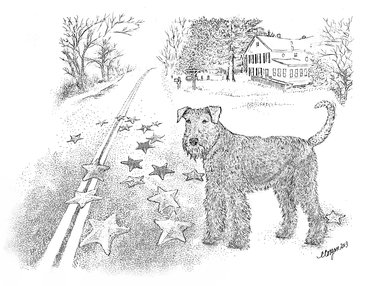Road to happiness paved with good deeds
We took our daily constitutional on a bleak wintry day, our Airedale bounding ahead of us, straining his leash. We felt the gray sky pressing down on us; the naked trees offered no comfort; the air was damp and chill.
We were happy to come across another walker — a man we knew, Carl Felix who runs a kennel and grooms our dog. As we fell in step with him, we couldn’t help but notice something we hadn’t really focused on before, stray bits of roadside litter.
Carl stooped to pick up a discarded can and put it in a blue plastic bag he carried. Our dog got the idea right away, and raced to fetch a trampled plastic bottle. It took us a while longer.
As we walked along the road, Carl told us this story:
There was a little boy who walked along the beach, he said, after thousands of starfish had washed up from the ocean and lay helpless on the shore. The boy stooped, picked up one, and flung it out to the safety of the sea, its home. And then, he stooped, picked up another and did the same thing. He did this again and again.
A man following behind the boy pointed out the foolishness of his mission. There are thousands of stranded starfish here, he told the boy, and you cannot save them all. At first, the boy did not answer. He just kept working at his task. But, as the man persisted in his derision, the boy flung another starfish to the sea and said, “I saved that one.”
Carl smiled widely as he stooped to pick up another piece of litter. Soon, we joined him in his task. He filled one bag and started on another. That one, too, was filled to overflowing.
As he walked, we heard the story of how he had moved to Brandle Road outside of Altamont. He and his wife, Mary, are from Staten Island. He had worked in Manhattan, at an information technology job, and rode the ferry to work every weekday. The best part of his day was always on the return trip home when his wife and their dogs would joyfully greet him.
As he rode the ferry to work on Sept. 11, 2001, Carl could see the first of the World Trade Center towers being hit. The ferry continued its journey and docked in Manhattan.
After that, his workplace changed. Barricades were set up and armed guards stood outside his building. One day, as he and his wife were walking their dogs in the park and talking about their future, they decided to make a life change, centering their future around the dogs they loved. Eventually, they combed the East Coast, looking for a kennel they might buy and run.
When they came to Altamont, they immediately liked the look of the village — and the area offered the handball Carl played, and the Indian foods his wife enjoyed. But what clinched it, Carl said, is, as he drove along Brandle Road, where we were now walking, a stranger waved to him.
If that happened in the city, he said, you’d roll up your windows and drive away fast. But here, Carl stopped his car, and got out to talk to the walker who had waved. He found a friendly fellow.
We parted our ways when our dog had walked as far as he would go and we’d heard the end of Carl’s stories.
On the long walk home, we no longer felt the chill. We stopped to pick up a discarded cigarette wrapper we’d missed on the way out. And we waved at the driver of a passing car we did not know.
Our dog wagged his tail.
— Melissa Hale-Spencer


